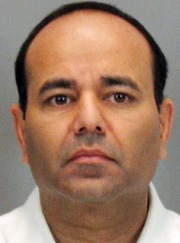Wednesday, Dec. 31, 2008 | 2 a.m.
Beyond the Sun
Related Documents
Federal investigators are examining the source of money that a San Jose, Calif., businessman used to pay off gambling debts to Binion’s and Caesars Palace, law enforcement officials say.
At issue, they say, is whether the money Ausaf Umar Siddiqui used to repay those debts was fraudulently obtained — a scheme he allegedly adopted to repay more recent debts to other Las Vegas casinos.
Based on an Internal Revenue Service investigation, the U.S. attorney’s office in San Francisco filed a criminal complaint Dec. 18 alleging that Siddiqui had used his position as a vice president of merchandising and operations at Fry’s Electronics to defraud vendors that did business with the company of $65 million. He earned $225,000 annually.
The government claims Siddiqui deposited kickbacks paid by vendors into the accounts of a straw company, PC International LLC, from which he repaid tens of millions of dollars in gambling IOUs to casinos.
Unrelated to the current complaint, Siddiqui has repaid $1.71 million to Binion’s and $4.8 million to Caesars Palace for debts dating to 2001, said Bernard Zadrowski, the head of the district attorney’s bad check unit. Siddiqui still owes Caesars $5.7 million, and has been paying a quarterly restitution of about $150,000, Zadrowski said.
In Nevada, a marker equates to a check, and failure to repay it constitutes a criminal offense.
Zadrowski and FBI spokesman Joe Dickey declined to comment on the new investigation.
If the federal case prevents Siddiqui from paying his local restitution, the bad-check unit probably will determine other means to punish him, Zadrowski said. Occasionally, defendants unable to pay off marker-related debt are imprisoned. “We’re going to see what the feds do next,” Zadrowski said.
Siddiqui also continues to face civil suits.
Besides Binion’s and Caesars, Siddiqui amassed gambling debts at the Venetian, MGM Grand and Planet Hollywood, according to court documents and law enforcement officials. The government has not indicated how much he gambled away in Las Vegas, but one newspaper has reported it was more than $120 million.
And this month, the Palms sued Siddiqui, claiming he stiffed the casino of $2.35 million in one day of gambling in August.
Because Siddiqui and the Palms essentially agreed to turn his outstanding markers into a loan, the casino could not ask the district attorney’s bad-check unit to pursue criminal charges.
Planet Hollywood sued Siddiqui this year, but the case was dismissed this month.
Trump Taj Mahal Associates in Atlantic City, N.J., has also sued him, a courts representative there said, though she could not determine what the judgment was.
The San Jose Mercury News found that casinos in southern New Jersey and in Uncasville, Conn., sued Siddiqui for at least $15 million. The newspaper reported last week that from January 2005 to November this year, Siddiqui spent $162 million from the PC International account, three quarters of which were payments to three Las Vegas casinos.
Siddiqui’s Northern California-based attorney, Eric Sidebotham, could not be reached for comment.


Join the Discussion:
Check this out for a full explanation of our conversion to the LiveFyre commenting system and instructions on how to sign up for an account.
Full comments policy